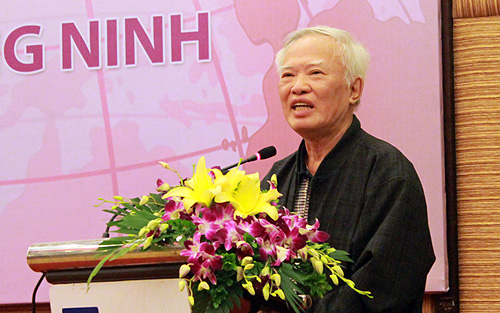Experts call for integration strategy

At a conference in Quang Ninh reviewing 30 years of global integration held by the Economic Commission of the Party Central Committee earlier this month, most analysts agreed that the nation might miss opportunities created by free trade agreements (FTAs) unless it has a comprehensive integration strategy in place.
Former Deputy Prime Minister Vu Khoan said he worried about the country’s ability to capitalise on opportunities arising from the upcoming FTAs.
Khoan said that over a long period of time the Vietnamese government has implemented step-by-step policies to integrate into the global economy. The country started from a low level to a high level, from ASEAN in 1995, to the Vietnam-America Bilateral Trade Agreement in 2001, and then joining the World Trade Organization (WTO) in 2006.
“We went from easy to difficult; that was the right direction. But right now, I see rapid-fire negotiation of FTAs,” said Khoan.
According to the Ministry of Industry and Trade, Vietnam is concurrently negotiating six FTAs, including the Trans-Pacific Partnership Agreement (TPP), the Vietnam-EU FTA, the Vietnam-Korea FTA, the FTA with Russia – Belarus – Kazakhstan Customs Union, the FTA with the European Free Trade Association of Iceland, Switzerland, Liechtenstein and Norway, and the Regional Economic Comprehensive Partnership Agreement between ASEAN and six other nations.
At least three FTAs are expected to be signed in 2015. In addition, the ASEAN Economic Community (AEC) will take effect from next year, setting up one market for ten nations in the Southeast Asian region.
The FTAs are expected to open more opportunities for foreign companies to enter the Vietnamese market, while at the same time allowing Vietnamese companies to expand into the global market. Moreover, it is expected that domestic companies can link up with foreign companies to join the global supply chain.
Tran Dinh Thien, director of the Vietnam Economic Institute, voiced his concerns about this.
“It seems that we just keep on negotiating new FTAs without preparing to take advantage of the opportunities made by these new agreements,” said Thien.
He said many domestic companies were still vague about the TPP, Vietnam-EU FTA or even the AEC. If domestic companies remain vague about upcoming FTAs, Thien said, they obviously had no preparations in place to exploit upcoming opportunities.
Vietnam’s experience in joining the WTO should be a lesson for Vietnam to take the opportunity from future FTAs.
The retail industry, for example, is an industry that the Vietnamese government tried to delay entirely opening up its market for foreign companies, following Vietnam joining the WTO. With three years of a delay, from 2006-2009, the Vietnamese government expected local retailers would have enough time to enhance its strength to compete with foreign players. But it seemed that there was no preparation made by local players, and foreign ones are now dominating the retail market.
And as Vietnam is going to join a whole raft of new FTAs, analysts continue to raise questions over the competitiveness of local companies. “I am surprised that Vietnam is negotiating six FTAs at the same time. Most of them will finish in 2015. We can’t stop now, but I see no action from the government and the local business community to face future challenges,” said Nguyen Mai, chairman of Vietnam’s Association of Foreign Invested Enterprises.
Khoan suggested that the government should immediately build a plan linking all the FTAs that defines the priorities of each partner, industry, and market. “If we have no plan to respond the challenges and to take these opportunities, what we get from the FTAs may be less than what we lose,” he said.
What the stars mean:
★ Poor ★ ★ Promising ★★★ Good ★★★★ Very good ★★★★★ Exceptional
Latest News
More News
- NAB Innovation Centre underscores Vietnam’s appeal for tech investment (January 30, 2026 | 11:16)
- Vietnam moves towards market-based fuel management with E10 rollout (January 30, 2026 | 11:10)
- Vietnam startup funding enters a period of capital reset (January 30, 2026 | 11:06)
- Vietnam strengthens public debt management with World Bank and IMF (January 30, 2026 | 11:00)
- PM inspects APEC 2027 project progress in An Giang province (January 29, 2026 | 09:00)
- Vietnam among the world’s top 15 trading nations (January 28, 2026 | 17:12)
- Vietnam accelerates preparations for arbitration centre linked to new financial hub (January 28, 2026 | 17:09)
- Vietnam's IPO market on recovery trajectory (January 28, 2026 | 17:04)
- Digital economy takes centre stage in Vietnam’s new growth model (January 28, 2026 | 11:43)
- EU Council president to visit Vietnam amid partnership upgrade (January 28, 2026 | 11:00)
















 Mobile Version
Mobile Version